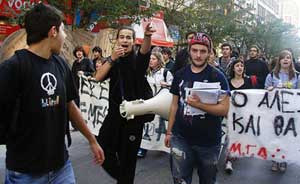Greece unions, youth in streets protest slashed wages & services
By
G. Dunkel
Published Dec 23, 2010 10:55 PM
Tens of thousands of workers in Greece took to the streets Dec. 15 to protest
the drastic austerity measures the Greek government has imposed on them, under
pressure from the banks that loaned money to cover its financial crisis.
|
Students protesting in Thessaloniki in memory
of Alexis Grigoropoulos, who was killed
by
police two years ago.
Photo: APAS
|
Some 80,000 workers marched on the parliament building in Athens, where they
confronted the cops. Some demonstrators confronted Kostis Hatzidakis, a former
conservative minister of transportation, as he left the parliament building,
yelling, “Thieves! Shame on you!” (L’Express, Dec. 15)
Blood running down his face, Hatzidakis managed to escape into another
building. The cops arrested a dozen people and injured three, while making
liberal use of tear gas, according to many media reports.
The slogans of the demonstrators were directed at the European Union and the
International Monetary Fund, which put together the loan package, and at the
wage cuts parliament proposed. Under the recent law, private employers are
allowed to cut wages up to 35 percent, and public employees can have their
wages cut by 15 percent. Layoffs and strict salary caps, which prevent workers
from using overtime to maintain their income, are also allowed.
However, it doesn’t appear likely that these wage and benefit cuts will
resolve Greece’s financial crisis. Greece’s public external debt is
$405.7 billion, which is 113 percent of its gross domestic product. Its exports
are $18.64 billion and its imports are $61.47 billion. (CIA World Fact
Book)
The cuts in wages and pensions and in government spending on things like roads
and ports will not cut the deficit enough to pay off the banks. According to
The Economist, the cuts will put Greece into a deeper recession, reducing its
GDP and making it more difficult to pay its debt.
Caught between the demands of the EU and the IMF on one hand and the anger of
its people on the other, the Greek government made its choice — go with
the banks. Whether or not this saves the Euro for the bankers, this choice will
continue to arouse struggle among workers in Greece.
Articles copyright 1995-2012 Workers World.
Verbatim copying and distribution of this entire article is permitted in any medium without royalty provided this notice is preserved.
Workers World, 55 W. 17 St., NY, NY 10011
Email:
[email protected]
Subscribe
[email protected]
Support independent news
DONATE


